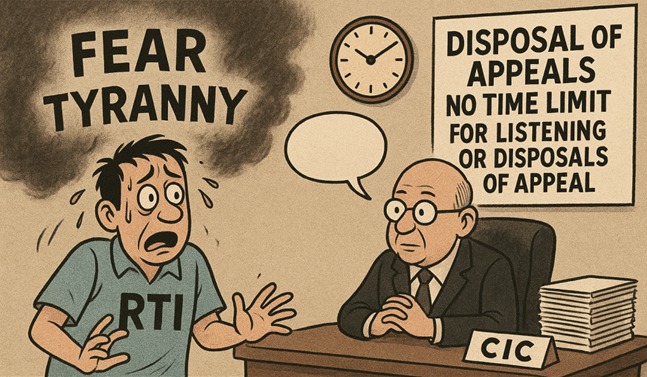Inordinate delay in the hearing and disposal of second appeals
25 Aug, 2025The Right to Information Act, 2005, was enacted with the objective of empowering citizens by ensuring transparency and accountability in the working of public authorities. The Act clearly prescribes strict timelines for furnishing information. As per Section 7(1) Subject to the proviso to sub-section (2) of section 5 or the proviso to subsection (3) of section 6, the Central Public Information Officer or State Public Information Officer, as the case may be, on receipt of a request under section 6 shall, as expeditiously as possible, and in any case within thirty days of the receipt of the request, either provide the information on payment of such fee as may be prescribed or reject the request for any of the reasons specified in sections 8 and 9: of the Act, a Central Public Information Officer (CPIO) is mandated to dispose of an RTI application within 30 days of its receipt. Further, if the information sought does not pertain to the concerned CPIO, under Section 6(3) of the RTI Act, the application must be transferred to the appropriate authority within 5 days of its receipt.
If the applicant is not satisfied with the response of the CPIO, the Act provides for a first appeal to the First Appellate Authority (FAA), which must be filed within 30 days. The FAA is required to dispose of the first appeal within 30 days of receiving it, and in case of any delay, the FAA must record and communicate the reasons for such delay, thereby ensuring transparency and timely justice to the applicant. In cases where the applicant is still dissatisfied, the Act provides a remedy to file a second appeal before the State Information Commission (SIC) or the Central Information Commission (CIC) within 90 days of the order of the First Appellate Authority.
However, the critical issue highlighted through the cartoon by Adv. Anmol Malhotra is the inordinate delay in the hearing and disposal of second appeals and complaints by the Information Commissions. Unlike the RTI applications and first appeals which have defined timelines, the Act does not provide any specific timeframe for the disposal of second appeals and complaints. This lacuna has resulted in pendency of thousands of cases, with many applicants waiting for more than 1.5 years, and in some cases, even longer.
The absence of statutory timelines for Information Commissions to decide appeals has rendered the Act toothless at this stage. Applicants are left in fear, anxiety, and helplessness, as the very purpose of seeking timely information is defeated. The cartoon starkly portrays this tyranny of delay, where the CIC is depicted as hearing cases only after years, leaving the applicant disheartened and anxious.
This situation raises a fundamental question on the efficacy of the RTI Act. When timely access to information is the soul of the legislation, what purpose does the law serve if appeals are left pending indefinitely? The urgent need of the hour is to amend the RTI Act to incorporate strict timelines for the disposal of appeals and complaints by the State and Central Information Commissions. Only then can the true spirit of the RTI Act be preserved and protected
Adv Anmol Malhotra






